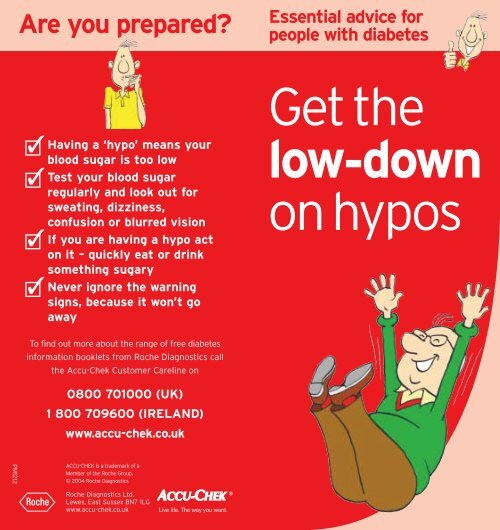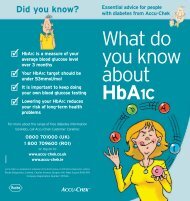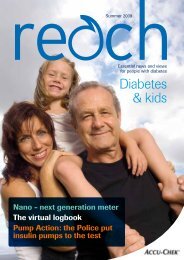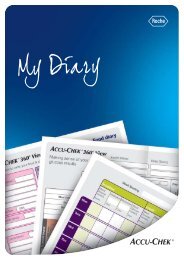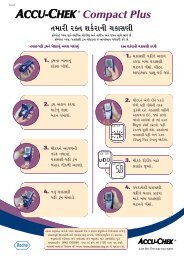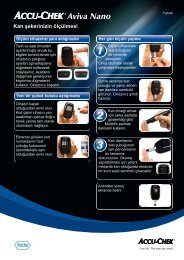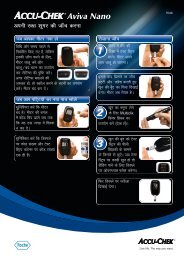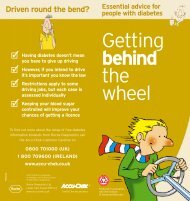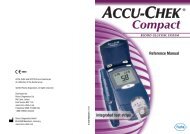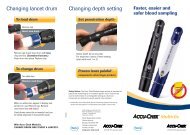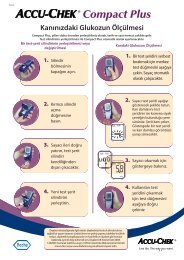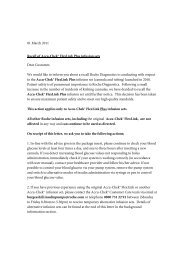Roche D/L 'HYPOS' 30/4/04 - Accu-Chek
Roche D/L 'HYPOS' 30/4/04 - Accu-Chek
Roche D/L 'HYPOS' 30/4/04 - Accu-Chek
You also want an ePaper? Increase the reach of your titles
YUMPU automatically turns print PDFs into web optimized ePapers that Google loves.
Are you prepared?<br />
Essential advice for<br />
people with diabetes<br />
✓<br />
✓<br />
✓<br />
✓<br />
Having a ‘hypo’ means your<br />
blood sugar is too low<br />
Test your blood sugar<br />
regularly and look out for<br />
sweating, dizziness,<br />
confusion or blurred vision<br />
If you are having a hypo act<br />
on it – quickly eat or drink<br />
something sugary<br />
Never ignore the warning<br />
signs, because it won’t go<br />
away<br />
Get the<br />
low-down<br />
on hypos<br />
To find out more about the range of free diabetes<br />
information booklets from <strong>Roche</strong> Diagnostics call<br />
the <strong>Accu</strong>-<strong>Chek</strong> Customer Careline on<br />
0800 701000 (UK)<br />
1 800 709600 (IRELAND)<br />
www.accu-chek.co.uk<br />
PM1212<br />
ACCU-CHEK is a trademark of a<br />
Member of the <strong>Roche</strong> Group.<br />
© 20<strong>04</strong> <strong>Roche</strong> Diagnostics<br />
<strong>Roche</strong> Diagnostics Ltd.<br />
Lewes, East Sussex BN7 1LG<br />
www.accu-chek.co.uk
The low-down on hypos<br />
The best defence against a hypo<br />
is regular testing and good<br />
control ...it’s not a guarantee,<br />
but it’s worth it. Emma, 31<br />
If you have diabetes, hypos are one<br />
of those things you have to deal<br />
with from time to time.<br />
But what is a hypo?<br />
‘Hypo’ (short for ‘hypoglycaemia’) is<br />
the medical word for low blood<br />
sugar and they happen if your<br />
blood sugar falls below a certain<br />
level (usually less than 4mmol/L).<br />
Although you can’t always prevent<br />
a hypo from happening - even when<br />
doing your best to keep your blood<br />
sugar balanced - you can control it<br />
if you take action quickly.<br />
That’s why it’s important you<br />
know what a hypo is, how to tell if<br />
you are having one and how to act<br />
on it.
What can cause a hypo?<br />
They’re not very nice, but<br />
being prepared helps. Tim, 18<br />
Anything that lowers blood sugar levels,<br />
can give you a hypo.<br />
Missed<br />
or delayed<br />
meals<br />
Drinking alcohol<br />
(especially on an<br />
empty stomach)<br />
Illness and stress<br />
Changes to your<br />
medication<br />
max<br />
Eating less<br />
than usual<br />
Unplanned activity<br />
Too much<br />
insulin<br />
Extremes<br />
of temperature<br />
Although a mild hypo can feel<br />
uncomfortable, it isn’t<br />
dangerous.<br />
But if you ignore how you’re<br />
feeling your blood sugar may<br />
continue to fall and a mild hypo<br />
can turn into a severe one.<br />
This can be dangerous and you<br />
could lose consciousness.
What to look out for<br />
Never ignore the warning signs<br />
and hope it will go away,<br />
because it won’t. Carrie, 46<br />
The sooner you know your blood sugar’s low, the<br />
sooner you can do something about it. But<br />
everyone reacts to low blood sugar in different<br />
ways, so it’s important you recognise your early<br />
warning signs and then act on them.<br />
If you do, you’ll have a better chance of stopping<br />
your hypo quickly.<br />
Severe hypo signs<br />
• Blurred vision • Drowsiness<br />
• Clumsiness • Confusion<br />
• Appearing to be drunk<br />
• Passing out (unconsciousness)<br />
Mild hypo signs<br />
• Sweating • Hunger<br />
• Anxiety • Shakes • Paleness<br />
• Rapid heart beat (Palpitations)<br />
Moderate hypo signs<br />
• Irrational/aggressive behaviour<br />
• Weakness • Irritability<br />
What if there aren’t<br />
any warning signs?<br />
If you have had diabetes for many<br />
years, or take heart or blood<br />
pressure medicine, you may not<br />
feel the signs of hypoglycaemia as strongly.<br />
This is called ‘Hypoglycaemia Unawareness’.<br />
It means you must check your blood sugar levels<br />
more regularly than most and look out for any<br />
sign of it dropping. If you have any questions or<br />
concerns about Hypoglycaemia Unawareness,<br />
speak to your doctor or diabetes nurse.
What to do about it<br />
Having a hypo can feel disorientating, so you<br />
might find it helpful to have a ‘Diabetes Partner’.<br />
Your Diabetes Partner should be someone you<br />
trust, someone who understands your diabetes<br />
and someone who is around you a lot when you<br />
may be at risk; like friends, family or work mates.<br />
Sugary foods & drinks<br />
• 2-4 Glucose tablets or sugar lumps<br />
• Pure orange juice/ Lucozade ®<br />
• Fizzy drinks (not diet) – a small glass<br />
• Follow-up with a complex carbohydrate<br />
e.g. digestive biscuit or bread<br />
Dealing with a mild hypo<br />
FIRST<br />
SIGN OF<br />
A<br />
HYPO<br />
NEXT<br />
TEST<br />
BLOOD<br />
SUGAR<br />
WAIT<br />
15-20<br />
MINS<br />
NEXT<br />
BLOOD SUGAR<br />
OK<br />
BLOOD SUGAR LOW<br />
NEXT<br />
EAT<br />
REGULARLY<br />
AND KEEP AN<br />
EYE ON IT<br />
EAT<br />
SOMETHING<br />
SUGARY<br />
*Hypostop is a trademark of Bio Diagnostics Ltd<br />
Dealing with a severe hypo<br />
If you have a hypo and can’t swallow, Hypostop* is a<br />
sugary gel you can rub into lips and gums. However, if<br />
you fall unconscious you will need immediate<br />
treatment, like an emergency GLUCAGON injection.<br />
Your Diabetes Partner may be able to inject you and<br />
give you a sugary drink when you awake. Failing this<br />
someone should dial 999.<br />
It is advisable to carry a MediAlert bracelet,<br />
and the card opposite with you, at all times.<br />
✂<br />
IF I FALL UNCONSCIOUS, OR<br />
IN CASE OF EMERGENCY:<br />
• Dial 999 and ask for help<br />
• Do not panic<br />
• Do not inject me with insulin<br />
• Do not give me food or fluids<br />
• Do not restrict my breathing
When to be on the look-out<br />
Down the gym<br />
I find exercise burns up my sugar really quickly. So I eat complex<br />
carbohydrates, like potatoes, rice or pasta, about 20 minutes before<br />
I start. I also keep a sugary drink with me as a top-up. Raj, 28<br />
Out on the town<br />
If I get a hypo it just looks like I’m tipsy, or drunk. That’s why I keep a<br />
good friend close by – they know what to do if I seem too drunk or<br />
get tired quickly from dancing. Lara, 22<br />
Feeling poorly<br />
Being unwell with things like colds, flu or fever affects my diabetes. But<br />
speaking to my doctor or diabetes nurse helped sort things out.<br />
Susan, 43<br />
Curled up in bed<br />
I HAVE<br />
DIABETES<br />
✂<br />
Most of my hypos are<br />
at night so I have a<br />
bedtime snack,<br />
especially if I’ve had<br />
a busy day. Paul, 58


